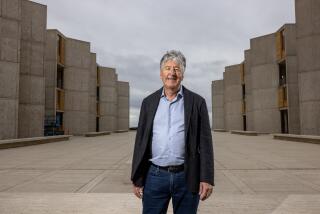I. Herskowitz, 56; Geneticist, Yeast Expert
- Share via
Ira Herskowitz, a UC San Francisco geneticist whose studies on yeast cells influenced many areas of modern cell biology, has died. He was 56.
He died at his home Monday of pancreatic cancer.
Colleagues described Herskowitz as an engaging, enthusiastic scientist who made major contributions to the understanding of genetics, loved to linger in the hallways to talk about science, and gave generously of his time to students and peers.
“He was able to convey this fascination of science -- the knowledge itself -- as just a wonderful thing,” said Keith Yamamoto, vice dean for research at the university’s School of Medicine.
Herskowitz was also known for his tongue-in-cheek folk songs poking fun at scientific life, which he would often perform at scientific meetings.
He was born in Brooklyn, N.Y., in 1946, and as a child moved with his family to Indiana. From his earliest days, he was exposed to science: His father, Irwin H. Herskowitz, was a geneticist at Indiana University, and the Herskowitz children would often hang out at their father’s workplace. They were especially captivated by the lab’s giant model of a Drosophila fruit fly, recalled Joel Herskowitz, Ira’s twin brother and a pediatric neurologist in Boston.
Ira Herskowitz attended Caltech as an undergraduate, then the Massachusetts Institute of Technology for his doctorate, where he studied the genetics of a virus that infects bacteria.
As a young professor at the University of Oregon, Herskowitz refocused his efforts on the study of the yeast Saccharomyces cerevisiae. The “awesome power of yeast genetics,” as he termed it, lay in the fungus’ simplicity, which made it ideal for tackling basic questions in cell biology.
Herskowitz made numerous key discoveries in the fungus. In experiments on yeast mating systems, he showed how the yeast cells could flip from one mating type to another by reshuffling their DNA. The finding was one of the earliest demonstrations of how “differentiation” occurs -- that is, how cells containing the same genetic information can nonetheless end up differing.
Herskowitz went on to make many other key contributions about the nature of yeast genetics that had wide implications for the biology of other creatures, including how genes are turned on and off at different stages of the yeast life cycle, and how yeast cells communicate using hormones.
In later years, he became keenly interested in pharmacogenomics -- the way in which genes affect people’s responses to drugs. He was collaborating on a project in that area at the time of his death.
Herskowitz was the Hertzstein Professor of Genetics in UC San Francisco’s department of biochemistry and biophysics, where he had been on faculty since 1982, and co-director of the university’s program in human genetics. He was a member of the National Academy of Sciences and the Institute of Medicine, and former president of the Genetics Society of America.
His awards include the Genetics Society of America Thomas Hunt Morgan Award, a MacArthur Foundation Fellowship and the 2003 Lewis S. Rosenstiel Award for Distinguished Work in Basic Medical Research.
Colleagues said that Herskowitz’s example and mentoring style helped yeast genetics burgeon into a thriving field. Many of those in his lab went on to make outstanding contributions in their own right.
“Even as a very young beginning investigator, he was an intellectual force in the field because of his crystal clear logic and his really beautiful lecturing style,” said Randy Schekman, professor of molecular and cell biology at UC Berkeley. “He trained a generation of scientists in this kind of logic and exposition.”
As a mentor, Herskowitz was generous with his help, said Jasper Rine, a professor of genetics at UC Berkeley and a former student of Herskowitz. He said Herskowitz would often follow up on a conversation days later with a letter containing further thoughts, even if he barely knew the scientist he’d been talking with.
Herskowitz was also an avid pingpong player, sports fan and music lover who especially liked folk and country music, his twin brother said. The two were constantly trading music selections.
Ira Herskowitz’s musical pastiches of life in the lab included “I’ve Been Working on the Genome,” “Nights in the Cold Room” and “Return to Sender,” a song about the angst of having articles rejected by scientific journals. He was also famed for his performance of “Double Talking Helix Blues,” composed by Joel Herskowitz.
Besides his twin brother, Herskowitz is survived by his parents, Reida and Irwin; his sister, Mara; and a brother, Alan.
A memorial service is planned for June at the Legion of Honor in San Francisco.
Donations may be made to UC San Francisco’s graduate program in genetics or the graduate program in biopharmaceutical chemistry. Checks, made out to the Regents of the University of California, should be sent to the UC San Francisco Department of Biochemistry and Biophysics, Genentech Hall, 600 16th St., San Francisco, CA 94143-2140.






